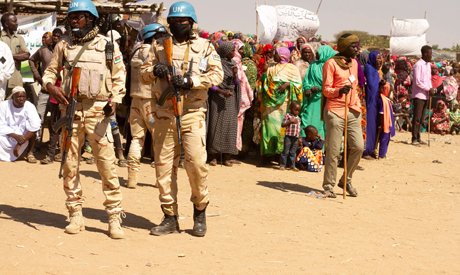Date: Friday, 08 January 2021

After 13 years of its deployment in Darfur, the joint UN-African Union peacekeeping force UNAMID has begun its withdrawal from the restive region of western Sudan amid fears of renewed violence between rebel militias and government forces and of unarmed civilians finding no one to protect them.
Optimists argue that the Sudanese government has signed peace agreements with most of the rebel movements and that its forces will now replace UNAMID in protecting civilians and preventing the outbreak of renewed fighting.
However, pessimists say that rebel groups such as the Sudan Liberation Movement led by Abdel-Wahed Nour have not signed the peace agreements and that they may resume the fighting and end the existing truce. There is also the possibility that the implementation of the peace agreements will falter and the factions that signed them may return to the fighting.
In the absence of a neutral party such as UNAMID that would be able to determine the cause of any collapse of the situation, each side will likely place the responsibility on the other. If this happens, the UN Security Council will likely halt the withdrawal process, which is scheduled to be completed by 30 June, and may reinforce the joint force.
The joint UN-African Union peacekeepers have succeeded to a large extent in reducing the fighting between government forces and rebel movements in Darfur and in protecting civilians in the region, but they have not been able to prevent bloody clashes between various tribes in the struggle over land, water and pasture.
The most recent example was the bloody clash between the Massalit and Fallata tribes a few days ago, and in this regard the UNAMID withdrawal will not have a significant negative impact.
Preventing the situation in Darfur from deteriorating will depend on many factors, among them the smooth implementation of the peace agreements between the government and the rebel movements, the adherence to their provisions, and the need not to circumvent them or misinterpret them in the interest of any of the parties.
The Sudanese government and mediators will also need to convince Abdel-Wahed Nour’s Sudan Liberation Movement and others to join the peace process.
The stability or deterioration of the situation will also depend on the commitment of government forces and the political leadership to restraint during the implementation of the peace agreements, especially when they begin to disarm tribes and militias in the region for whom weapons are an essential part of their traditions and need for self defence.
It would be better not to try to seize such weapons by force, since this could lead to clashes in which innocent lives could be lost. The task should be left to the leaders of the factions who have signed the peace agreements and the sheikhs of the various tribes.
Prospects for peace will also depend on the government’s ability to implement the peace agreements and the speed with which it does so. These call for providing security for civilians, assisting the displaced and refugees to return to their homes, compensating those affected by the war, returning usurped land and property to its owners and removing those who have illegally seized it, and handing those responsible over to justice.
Difficult matters like returning usurped land to its owners, expelling usurpers from it, arresting criminals and handing them over for trial and disarming tribes and militias could generate bloody clashes.
If this happens, it could provoke further violence, which government forces may feel they need to confront with force. Accusations of human-rights violations could then be made against the government, which is trying hard to have the international sanctions against Sudan lifted in order to save the country’s deteriorating economy.
Such accusations could also be exploited by rebel movements under the pretext of defending the rights of their people, stalling the implementation of the peace agreements or leading to their withdrawal from them.
Another important factor that will contribute to achieving stability or the lack of it is the extent to which the African tribes in the region still feel that the government in Khartoum is siding with the Arab tribes against them.
Demonstrating its seriousness in achieving the equality of rights and duties for all will not be an easy task for the Khartoum government.
The UN Security Council agreed to end the mission of UNAMID, deployed in the region since 2007 and with 16,000 peacekeepers at its peak, when its mandate expired on 31 December. This was requested by the Sudanese government and backed by China, Russia and African members of the Security Council.
Following a peace deal with rebel groups in October, the government is to take over security in a region where hundreds of thousands of people have died since conflict broke out in 2003.
Sudan’s “transitional government is committed to providing security and stability for all citizens of the Darfur states,” according to a statement from the Sudanese Foreign Ministry. “It will continue its efforts to address the roots of the problem and consolidate the foundations of tribal reconciliation and lay the foundations for transitional justice and the rule of law.”
However, the international rights group Amnesty International has asked the UN to extend its mission for six months, citing what it says is the inability of the Sudanese government to protect civilians in Darfur.
The region has been the scene of a bitter conflict that broke out in 2003 between African minority rebels, complaining of their marginalisation, and armed groups backed by the government of ousted former Sudanese president Omar Al-Bashir.
Although the conflict has largely eased in recent years apart from scattered confrontations over land and water resources between nomadic tribes and farmers, attacks are still common, and many civilians in the region are concerned about the withdrawal of the peacekeepers.
The UN estimates that the fighting has killed 300,000 people, mostly in the early years of the conflict, and that about 500,000 of 2.5 million displaced people still live in camps in the region.